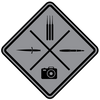
Covert Operations Sticker Pack - 3" to 5" wide
- Low stock - 8 items left
- Inventory on the way
Get these six stickers representing some of the most famous clandestine operations of the Cold War. Each one is between 3" and 5" wide.
- Assault Brigade 2506.
On 17 April 1961, five battalions of CIA-trained and -armed Cuban paramilitary exiles known as the 2506 Brigade invaded Cuba at the Bay of Pigs, intent on overthrowing the Castro Regime. The invasion was ultimately unsuccessful and over one hundred anti-communist rebels were killed, and the remainder captured by the end of the fighting on 20 April 1961. The failed Bay of Pigs invasion remains one of the defining moments of the Cold War. To this day, strong anti-Castro sentiment exists among the Cuban exile population in south Florida and elsewhere.
This sticker is a faithful reproduction of the unit patch issued to all 2506 Brigade members. The number 2506 was selected for the member number of Carlos Rafael Santana Estevez, the first volunteer to die during training for the fateful mission.
- The 2506 Fighting Hornet.
A fighting hornet originally drawn by one of the Bay of Pigs invaders, recreated here for the first time ever.
Julian Buznedo Castellanos, a helmsman on the Barbara J, drew this hornet to represent the men of the 2506 Brigade in April 1961. The Barbara J was a converted freighter purchased by the CIA to support the invasion of Cuba at the Bay of Pigs, one of the most famous (and forlorn) events of the Cold War.
The hornet is carrying an M3 submachine gun, commonly called a Grease Gun. The M3 saw service in World War II with the US Army and Marine Corps, and was a mainstay of the CIA's paramilitary arsenal for many years to come. The hornet is also equipped with a web belt carrying a pistol holster and several pistol magazine pouches.
Below the hornet can be seen a highly stylized depiction of the islands of Cuba and the Isle of Pines (now known as the Isle of Youth).
- Gladio Silendo Libertatem Servo.
Gladio was a network created by the CIA and other partner organizations to form a stay-behind network to fight back against Soviet occupation forces in the event the Cold War turned hot. Some of these stay-behind networks turned to criminal activity and political violence using the training, weapons, and equipment they’d received and stockpiled for the next war.
Networks existed in almost every nation in Western Europe, under many different names. Gladio (Sword, in Italian) was the name of the Italian stay-behind network, and the name which is now most closely associated with all of these independent networks.
Gladio's slogan, depicted here, was Silendo Libertatem Servo (In Silence, We Serve Freedom). Although never called upon to fight behind enemy lines in World War III, these networks left an indelible mark on every country in which they formed; a mark which is still felt today, and which many governments still grapple with.
- Hughes Glomar Explorer.
This sticker is a reproduction of the shoulder patch produced for sailors and civilians assigned to the Glomar Explorer ship of the famed Project Azorian.
The Hughes Glomar Explorer represented the most audacious, expensive intelligence operation in CIA History. Initiated in 1971, with cooperation from eccentric billionaire Howard Hughes, the project built a specialty ship designed to raise a sunken Soviet submarine from it's final resting place, 11,500 feet deep in the Pacific Ocean. The ship got underway in 1974 with a cover story of mining manganese nodules from the ocean floor as a commercial venture.
The crew, who wore this uniform patch, were successful in raising a portion of the submarine's bow, which contained a ballistic nuclear missile, classified code logs, and the bodies of several Soviet crewmembers. The crewmembers were given a respectful burial at sea, and the intelligence collected proved a gold mine for the United States.
- Che Guevara Red Star.
This is Che Guevara as you've never seen him before (i.e., post mortem) after he was caught in Bolivia in 1967.
The CIA sent one of their best to stop Che’s plans to topple another Latin American government. Cuban exile Felix Rodriguez joined the CIA in 1960 and was soon sent back into Cuba on an intelligence-gathering mission prior to the ill-fated invasion at the Bay of Pigs. Seven years later he went to Bolivia to take down Che. The mission was a success as the rebels were poorly equipped and supported and were picked off one by one. Che was eventually captured, and Rodriguez questioned him prior to his execution. Che was then shot by a young Bolivian soldier who had lost three of his friends in fighting with Che’s forces.
- Project GAMMA Unit Patch.
Detachment B-57 of US Army Special Forces was a special missions unit tasked with intelligence collection activities in Cambodia during the Vietnam War. The unit, primarily composed of local indigenous personnel led by six Green Berets was responsible for the majority of the ground intelligence collected in Cambodia during their time in country.
B-57 is best known for the infamous killing of Chu Van Thai Khac, a double agent within their ranks. Several team members were arrested and charged with the extralegal killing, though they claimed they were ordered to terminate Chu "with extreme prejudice". All charges were eventually dropped.
These stickers are shipped for free and also include a free Soviet Ruble and free Cold War-era stamps, while supplies last. Get them now!

